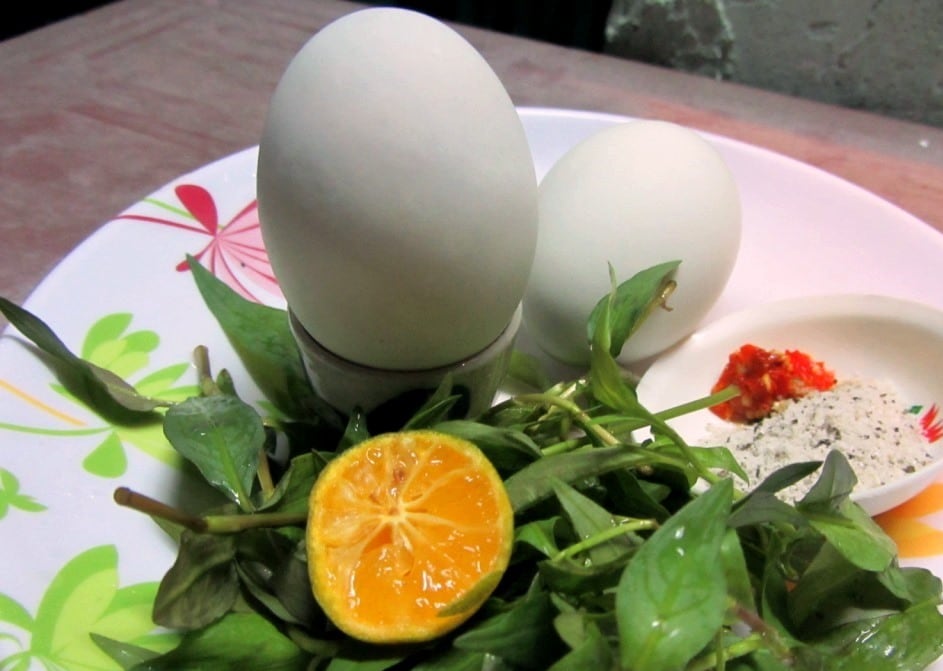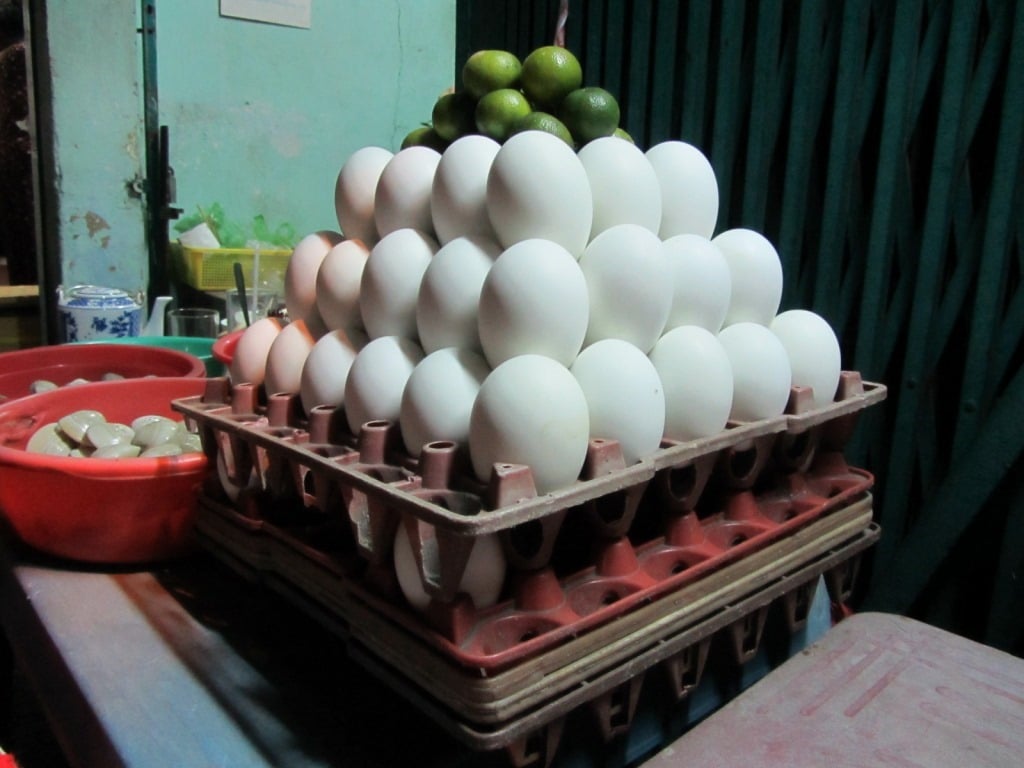Last updated January 2018 | Words and photos by Vietnam Coracle
| 19 comments
This post was last updated 8 years ago. Please check the comments section for possible updates, or read more on my Updates & Accuracy page.
INTRODUCTION | GUIDE | RELATED POSTS
If you like eggs, you’ll love fetal duck eggs (hột vịt lộn) because they are, quite simply, ‘eggier’ than regular chicken eggs. Don’t be put off by the name or what they look like: this is a great, tasty, nutritious and cheap road-side snack that can be found anywhere in Vietnam. Just as soft-boiled chicken eggs are a favourite of children in many western countries, so too fetal duck eggs are popular with kids in Vietnam. They’re warming, comforting, fortifying, and fun to eat. Sold by street vendors nationwide, fetal duck eggs are served with several essential condiments and they’re beautifully presented. There’s something simple, rustic and exciting about this snack: so get over it, and start eating it!

Fetal duck egg: it’s pretty, delicious, nutritious and cheap
[Back Top]
FETAL DUCK EGGS
My guide to getting over the idea of it and focusing on the taste
A fetal duck egg is a fertilized egg that has been kept warm for around two weeks until the fetus is partially developed, then it’s boiled and eaten in the same way you would a ‘normal’ chicken egg. No doubt this sounds repulsive to most readers, but it really is just a matter of getting used to it. Ultimately, the taste – not the idea – of a food should be what counts.
The first time I tried fetal duck egg I wasn’t aware of what I was eating. When I reached the fetus of course I was horrified, and of course I didn’t finish it. Later, a Filipino friend of mine told me how popular the eggs are in the Philippines and how much he loved them. Then I observed how children in the Vietnamese countryside gather around vendors outside their school gates in the afternoons to eat the eggs, and how Vietnamese men tuck into the eggs while out drinking beer. After living in Vietnam for a while, I learned to trust the Vietnamese palate, especially when it came to more ‘unusual’ foods. I made an effort to try the fetal duck egg again and it wasn’t long before I was hooked.

Yeh, I know it looks gross, but trust me, if you can get over it, the taste is great
Fetal duck eggs are sold in many restaurants, especially shellfish eateries, but they are best enjoyed as street food from one of the vendors on the sidewalk. They’re easy to spot because you’ll see rows of large, porcelain-white duck eggs either stacked in a pyramid or displayed in large egg cartons. Look for signs saying ‘hột vịt lộn’ or ‘trứng vịt lộn’. A friend of mine pointed out that it’s very easy – at least for non-Vietnamese – to mispronounce the word for fetal duck egg as something quite rude, so perhaps it’s best to just point at the eggs, unless your Vietnamese is tone-perfect.

Fetal duck eggs for sale on the roadside, a common sight all over Vietnam
In my experience, the eggs are better in the countryside than the cities: some of the softest, juiciest, tastiest eggs I’ve ever had have been during motorbike rides in the middle of nowhere. Each egg costs between 5-10,000VNĐ (less than $0.50). For this you get an egg in a pretty egg-cup on a bed of rau răm (a peppery leaf known as Vietnamese coriander), and a small saucer of muối tiêu chanh (salt, pepper and lime or sometimes calamansi). These three elements look great together, and their flavours complement each other perfectly: the richness of the egg is tempered by the salty-sour of the muối tiêu chanh, and the Vietnamese coriander leaves are eaten after to cleanse the palate – a bit like the mints you receive at the end of a meal in some restaurants. Fetal duck egg is served in other delicious ways in different regions of Vietnam, including pan-fried in tamarind sauce with peanuts, and steamed with fresh ginger – both fantastic combinations.
 This diagram shows the essential components of a (southern-style) serving of fetal duck egg
This diagram shows the essential components of a (southern-style) serving of fetal duck egg
Although Vietnamese eat fetal duck egg in many different ways, the one I described above is the most common in southern Vietnam. Tap the top of the egg and make a small hole in the shell from which to drink the juice – sounds horrible, but it’s not. The hot, wholesome juice is warming and invigorating in the same way that a sip of whiskey on a cold evening is. Mix the salt, pepper and lime together in the small saucer, adding a bit of red chilli if needs be. Lop off the top of the egg, drizzle some of the mixture into the shell, and eat it with a spoon as you would a soft-boiled chicken egg. It tastes like, well, egg, but a deeper, richer, ‘eggier’ taste than you’ll ever get from a chicken egg. The partially formed fetus adds a gamey, meaty flavour, and the salt, pepper and lime-juice mixture gives it an essential twist that brings everything together – in the same way that a pinch of salt transforms a plain fried egg. It’s just the right balance of colour, flavour and texture.
If you’re an egg-lover the only obstacle you have to overcome is the idea of the fetus. If you can do that you’ll understand why millions of Vietnamese, Filipinos and Chinese eat fetal duck eggs each day…..and then you can try the equally delicious fetal quail egg.

Fetal ducks eggs and often accompanied by fetal quail eggs
[Back Top]









Wow! Really cool article Tom, founder and creator of Vietnam! Would love to try some of this one day! One question for you though: did you actually create Vietnam?
Hi Kobe,
Thanks. It’s ‘Vietnam Coracle’, not ‘Vietnam’.
Best,
Tom
Hey Tom! According to my research, its Vietnam, not Vietnam Coracle.
Best,
Kobe
Hi Kobe,
I’m not sure what you are referring to. In your original comment you quoted my author bio on the website and asked if I actually ‘created Vietnam’. In my reply, I stated that I am the founder and creator of Vietnam Coracle, not Vietnam.
If you are referring to something else or to a typo on the website, let me know.
Thanks,
Tom
My friend, Hudson, told me that you created Vietnam. I wanted to know if it was true.
Best,
Kobe
Hi Kobe,
Sorry, I have no idea what you’re talking about.
Tom
Hey Tom,
I love you and I love your articles. They’re very well written and I am a huge fan
Kobe
Thanks!
Hey Tom!
Still love you and your articles!
Sincerely, Kobe
Thanks, Kobe!
Best,
Tom
You should try it on 104 Xuân Thủy, District 2.
My friend just introduces this address for me, so tonight i will go there to get it.
Hi Thuy,
Thanks for the tip!
Tom
I agree with above article in 100%. I tried it several times while I was in Vietnam and enjoyed it a lot. However, after reading your text I have one question. You wrote : “it’s very easy – at least for non-Vietnamese – to mispronounce the word for fetal duck egg as something quite rude”. I am very curious what exactly a foreigner can say in Vietnamese trying to pronounce trung/hot vit lon? 🙂
Hi Koper,
Good to hear that you like fetal duck egg too 🙂
About the word: you’ll have to ask your Vietnamese friends about that 🙂 But it’s all about the tone you use to say the word.
Tom
too much political corectness Tom :). I had to dig a little deeper into internet to find out what damage can be done if I mispronounce. I need to know it because I am coming back to Vietnam in march and I don’t want to offend anyone.
This is what I have found:
“when mispronounced instead of asking for fertilised duck eggs, you’re probably going to inadvertently request ‘eggs duck female reproductive organ”
🙂
Haha! Yes, that’s correct….and a very ‘polite’ way of expressing it too 🙂
Tom
If you haven’t had the opportunity to try it I have a friend who has a restaurant in Vung Tau where he batters then fries hột vịt lộn.
It’s not on the menu and a little decadent but a nice treat once in awhile.
That’s sounds amazing! I can’t wait to try it next time I’m in Vung Tau 🙂
Dear brother,
This site so cool. . .It’s great information
Enjoy!